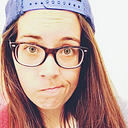Hannah Gadsby on Quitting Comedy, Telling Her Story, and the Destructive Nature of Shame

Hannah Gadsby is quitting comedy. It’s a bold statement for a comedian to make at the beginning of her new comedy special, but one she’s sincere about.
“I just felt I got to a point in my career, I was so frustrated…I couldn’t reconcile the power I had on stage with the lack of power I had in the world,” said Hannah. “So I felt like the only thing I could do was to use my platform to shake it up.”
And she does. In her hour-long special Nanette (which is available on Netflix starting June 19), Hannah uses stand-up comedy to subvert comedy itself. The show is refreshingly honest, a rollercoaster of emotions, and draws from Hannah’s experiences growing up in a small town in Tasmania, where, as a lesbian, she felt like an outsider. In Tasmania, being gay was a crime until 1997 — not that long ago. In Nanette, Hannah talks about how growing up in that environment made her change the way she chooses to tell her story now.
“It’s really important to acknowledge just how rotten shame is and how pervasive it is. And while going back and reconstructing your story in a more positive way, feeling trapped in shame has no easy out. There is no easy out.”
“I’m not broken, the world is.” — Hannah Gadsby
Shame is something she’s been grappling with for years, and she knows others have as well. With Nanette, Hannah shines a light on the destructive effect shame has had on her life. She points out just how often stand-up comedians attack those who are already marginalized — people like her — as cruel punchlines, all under the guise of being funny.
In Nanette, Hannah says she’s done with self-deprecation, which she says is about humiliation rather than humility. “Why am I putting myself down on stage when that’s all I get offstage?” said Hannah.
Another point Hannah brings up in Nanette is a real struggle in our culture, especially since #MeToo — when men are accused of terrible acts, we often say “separate the art from the artist,” but why do we give these artists a pass on unacceptable behavior? It’s about where our values lie.
“I think art is important and artists are important in that they create art,” says Hannah. “But if that art has created the distraction of the well-being of others, I think we need to seriously reconsider how much we value that.”
Powerful “geniuses” are oftentimes treated as more important than victims, and in Nanette, Hannah reminds us that by allowing these men to remain, we ignore the potential of the victims themselves, which negatively impacts our culture as a whole.
“I just don’t think people need to hang onto these toxic figures, because that then becomes part of the story, and that normalizes things that should not be normalized.”
That normalization happens because these artists are the ones telling our stories. Hannah studied art history in school, and in Nanette, she shows how this cycle has continued throughout centuries, ultimately leading to the stories of these powerful men being the ones told over and over.
“These men control our stories, and that’s ultimately what my problem is. They’re controlling our stories. They’re shifting our culture. They’re the ones people look at and go: ‘This was a turning point in our culture. This art is important because this great artist did this thing.’ So they’re essentially driving culture and driving our sense of selves culturally. And they’re toxic, irresponsible, damaged humans.”
That’s one reason why Nanette is so important. We need to hear the stories of people like Hannah — people whose stories don’t usually get told.
“I’m moved by how many different types of people have found a connection to what I thought was a really idiosyncratic story,” said Hannah. “I thought my story would seal me off into the margins — both in my career and as a human. And I was comfortable with that life. I was just tired of trying to work out how to talk to a mainstream audience. I thought, ‘I’ll just tell you and leave.’ And the opposite has happened, and that’s been really super wonderful for me.”

Human connection is something Hannah stresses in Nanette as well. That shame Hannah felt for so long — the shame that impacted her life for so many years — doesn’t have to be the destiny for the next generation.
“If you’re in trouble as a kid, your community is letting you down. Your family is letting you down,” says Hannah. “And I think older people need to acknowledge that and make sure this doesn’t keep happening. It’s a myth to think that you can make it on your own. You simply cannot make it on your own. We’re humans. We’re to be connected.”
Hannah Gadsby quit comedy in the best way possible — demanding that we be better, reminding us that we have stories to tell, and expecting us to make a difference.
But is she really done with comedy?
“I think I’ll continue in some way or another to tell stories. Whatever I do, humor will be a strong, strong part of it. I’m not too worried about it, but I think stand-up comedy is something I won’t be in a hurry to go back into. I don’t think I feel obliged to either.”
Nanette is available on Netflix starting June 19. You can follow Hannah on Twitter or check out her website to see where she’ll be telling stories in the future.











